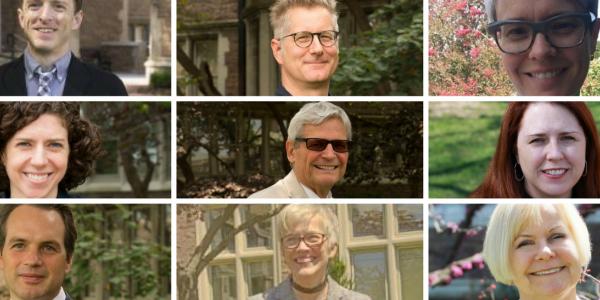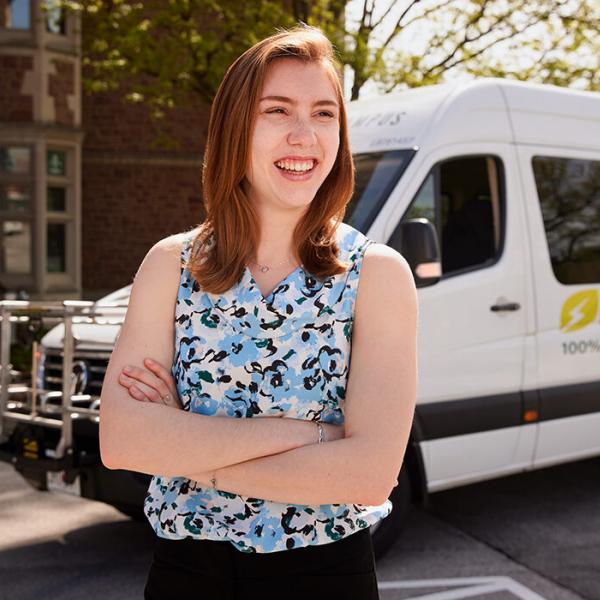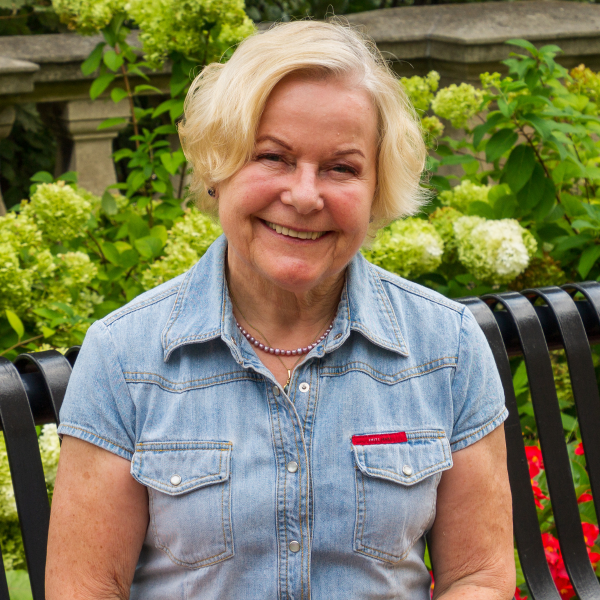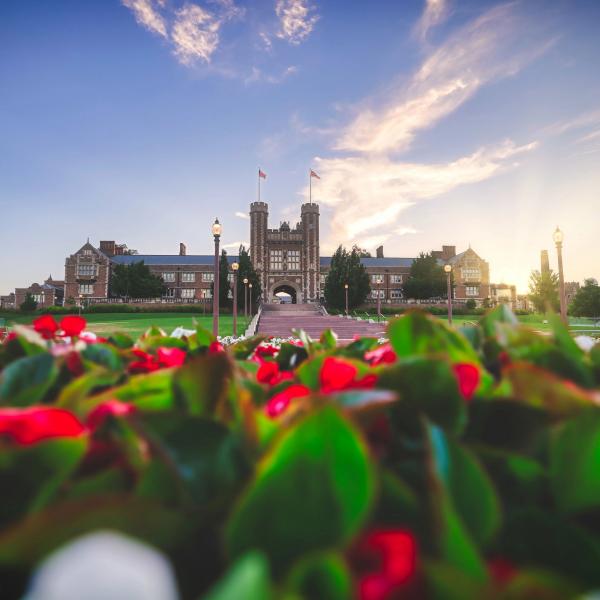The faculty update us on their activities in 2016.
Kurt Beals
This year I’ve had the chance to make significant progress on my current manuscript, “The Birth of Poetry from the Spirit of the Machine”: New Media in German Experimental Poetry, 1916-1968. A summer faculty research grant allowed me to visit libraries and archives in Berlin, Zurich, and Paris, and I’ve spent the Fall 2016 semester as a faculty fellow in Wash U’s Center for the Humanities, revising and expanding my manuscript and benefiting from the feedback of colleagues. I presented work related to my project at the conference of the International Comparative Literature Association in Vienna this summer, and also co-sponsored a panel on the 100th anniversary of the Dada movement at the conference of the German Studies Association in September. In the meantime, I’ve also continued my translation work. This past March, my translation of Reiner Stach’s book Is That Kafka? 99 Finds was published by New Directions Publishing Corp., and in November I had the chance to join the author for a reading and conversation at NYU’s Deutsches Haus in New York. Stach’s book was also one of the inspirations for a new course on Kafka that I offered in Spring 2016, which gave students a chance to see Kafka from unexpected angles – not as an existentially anguished outsider, but as an author highly engaged with the everyday life of his era, from air shows to fitness trends to rides on the Paris Metro.
Matt Erlin
My responsibilities as Chair have kept me on my toes over the past year, especially as a result of some new initiatives in graduate education that the department has been developing. Be sure to check the website in the spring for updates! In terms of research, my focus continues to be on projects in the digital humanities undertaken in the context of “Text Mining the Novel,” a six-year, multi-university partnership grant funded by the Social Sciences and Humanities Research Council of Canada. I recently completed a comparative essay addressing epistemological themes in a large corpus of German and English novels, and I am currently working on a collaborative project with Lynne Tatlock that investigates the history of reading in 19th century America. Teaching is always a pleasure, and I particularly enjoyed the recent opportunity I had to teach “Germany Today” for the first time, one of the anchors of our undergraduate curriculum. I also designed and taught a new graduate seminar entitled “Goethe and the Idea of the Novel” in spring 2016. Perhaps the biggest highlight of the year came during the summer, when I received news that my book Necessary Luxuries had received the DAAD Book Prize for best book in German Literature or Cultural Studies published in 2014 or 2015.
Frieda Fichtner
This past year, it was particularly exciting for me to design and teach a new undergraduate course entitled “In Search of a Vanished State: The GDR Between Reality and Memory.” In my graduate courses in second language acquisition and foreign language pedagogy and outside of the classroom, I enjoyed teaching and coordinating our first-year language courses and assisting our graduate students in their development as foreign language teachers. As a researcher in applied linguistics, I continued to investigate the role of sociocultural/sociopragmatic knowledge in the foreign language classroom, with a particular focus on the (mis)alignment of native speaker and learner perceptions of German culture. In November, I had the opportunity to present my study findings at the conference of the American Pragmatics Association for the first time. Earlier this year, I also presented at the conference of the American Association for Applied Linguistics in Orlando and at the International Conference of Intercultural Competence in Tucson, Arizona. I recently completed an article that explores how native speakers of German perceive their use of L1 expressions of affection.
Jennifer Kapczynski
After an eventful and rich fall 2015 semester (which included teaching a new undergraduate course on contemporary German film, continuing in my role as departmental director of graduate studies as well as co-chair of the university-wide Standing Committee on Facilitating Inclusive Classrooms, co-leading a seminar at the German Studies Association conference on the topic of “Making Democratic Subjectivities,” and giving a research talk at Smith College) I was lucky enough to spend the next two semesters on academic leave. My leave began with a bang in January 2016, when I traveled to Bielefeld, Germany to present part of my current book project at an international conference on European masculinities. The project, with the working title “The Subject of Democracy,” was also the focus of my fellowship semester in spring 2016 at Washington University’s Center for the Humanities. I spent fall 2016 on sabbatical, continuing to work on my book, which explores the role played by Adenauer-era cinema in the construction of democratic subjectivity. In November, I was excited to see the fruits of my last symposium appear in print, the anthology Persistent Legacy: The Holocaust and German Studies (co-edited with colleague Erin McGlothlin). I am currently writing two pieces: an article about the uses of posture and gesture in postwar West German film to represent political stances, and a chapter about how the Bundeszentrale für Heimatdienst, created in 1952 with the express purpose of encouraging popular attachment to democracy, sought to employ film as a means of political persuasion. I’m excited to return to teaching in spring and take on a new role as Director of Undergraduate Studies!
Caroline Kita
After spending fall 2015 in Vienna on a research leave with a fellowship from the Austrian Exchange Service (OEAD), I returned to St. Louis in 2016 to complete my book manuscript, which examines musical poetics and Jewish subjectivity in the works of Viennese writers and composers at the fin-de-siècle. Two articles related to this project have appeared in print this year, "Richard Beer-Hofmann’s Die Historie von König David: Jewish Biblical Drama and the Limits of Epic Theater” in the German Quarterly and "Between Instinct and the Law: Dionysian Dissonance and Polyphonic Poetics in Arnold Schoenberg’s Totentanz der Prinzipien," in the Journal of the Arnold Schoenberg Center. In March 2016, I traveled back to Vienna to participate in the Austrian Studies Association annual meeting, where I presented a paper on Franz Werfel’s biblical pageant, Der Weg der Verheissung. This research emerged from my recent archival work in the Werfel papers at the University of California, Los Angeles. On the teaching front, I have implemented a new textbook, Denk Mal, for our intermediate level German curriculum and this fall I had the pleasure of teaching an interdisciplinary graduate seminar on Vienna 1900. I am looking forward to beginning a new project on the soundscapes of post-war Hörspiel in summer 2017 with the support of a Center for the Humanities Faculty Research Grant.
Paul Michael Lützeler
This past year I taught a new undergraduate course in International Studies on European Utopian Settlements in the Midwest. Besides the readings the class visits of these Utopian places along the Mississippi river were memorable. On the graduate level I had to fill in for the writer Albert Ostermeier (who could not come due to a sudden illness) learning a lot about contemporary receptions of the Nibelungenlied. Many of my lectures – due to Brexit and the refugee problem – had to do with different aspects of the literary discourse on Europe (Düsseldorf MLA, Deutscher Germanistentag, Alexander von Humboldt Foundation symposium, conference at Groningen University). Of particular interest was – three days after Brexit - the annual meeting of the Academia Europaea in Cardiff (where I received my membership diploma). As president of the Internationaler Arbeitskreis Hermann Broch I co-organized a Broch symposium in Zadar and gave lectures on the author at the universities of Vienna and Innsbruck. As president of the American Friends of Marbach I co-organized the symposium “Text/Image/Sound” at the Deutsche Literaturarchiv. I also chaired a session on contemporary German literature at the GSA convention in San Diego. During my summer research at the DLA in Marbach I concentrated on the edition of the correspondence between Hermann Broch and Frank Thiess. On the publication side I co-edited the “Hermann Broch Handbuch” as well as a volume with new research on Broch’s novel “The Death of Virgil”, and the 15th volume of the yearbook “Gegenwartsliteratur” with a focus on Christoph Ransmayr. Furthermore I published articles on the literary discourse on Europe (in a Europe volume with Routledge) and an essay on the role of literature in the GSA in the 40th anniversary volume of the “German Studies Review” as well as an article on Broch and Kahler in the Festschrift for Friedrich Vollhardt.
Erin McGlothlin
This year was an active one for me with regard to teaching and research about the Holocaust. I, along with my colleague in history Professor Anika Walke, introduced a new Focus program for first-year undergraduate students on the history, memory and representation of the Holocaust. After participating in a year-long seminar that included a course on the history of the Holocaust with Professor Walke and one on Holocaust literature and film taught by me, the students, along with Professor Walke, German Studies librarian Michael Vetruba, Assistant Dean Michael Getty and me, embarked on a 12-trip to Holocaust-related sites in Germany, Poland and Lithuania. My teaching of Holocaust literature continued in June, when I was invited to be an instructor at the 2-week Holocaust Educational Foundation Annual Summer Institute for Faculty on the Holocaust and Jewish Civilization at Northwestern University. In terms of publications, my article “Empathic Identification and the Mind of the Holocaust Perpetrator in Fiction: A Proposed Taxonomy of Response” appeared in the journal Narrative, and Persistent Legacy: The Holocaust and German Studies, a volume I edited with Jennifer Kapczynski, appeared with Camden House. My work on my monograph “Constructing the Mind of the Holocaust Perpetrator in Fictional and Documentary Discourse” continues, as does work on “The Invention of Testimony: Claude Lanzmann’s Shoah in the Twenty-First Century,” which I’m co-editing with Markus Zisselsberger and Brad Prager and which focuses on the over 220 hours of outtakes of Shoah held by the US Holocaust Memorial Museum and Yad Vashem. In the department, I’ve taken over the responsibilities of Director of Graduate Studies, and I’m currently serving on the university level as the Secretary of the Faculty Senate and Faculty Senate Council.
Christian Schneider
The first half of the year was occupied with two conferences that I had the pleasure to co-organize. From March 31 to April 2, our department hosted the 23rd International Symposium on German Literature & Culture. Gerhild Williams and I chose for our topic “Knowledge in Motion.” Scholars from Austria, Canada, Germany, Switzerland, and the United States joined us for three days to explore movements of knowledge in the medieval and early modern periods. The other symposium, held from June 3 to 5 at Heidelberg University, Germany, was an exciting effort to bring together graduate students, junior and senior colleagues from Medieval Studies, Contemporary Literature, and Film to discuss what a “happy end” is and how stories come to a happy ending. Another wonderful experience in the spring: teaching my undergraduate course on medieval Arthurian romance. The second half of the year was somewhat calmer then. I had the good fortune to spend a research leave as Marie Curie Fellow of the European Union at the Freiburg Institute for Advanced Studies. Looking out at the spire of the city’s gothic cathedral and the blue shades of the Black Forest, I’ve been working on my monograph on narrative logic in medieval German epics. My article “Medieval Literature on the Air: Johannes von Tepl’s Der Ackermann in Twentieth-Century Radio Adaptations” appeared in the journal Seminar and several other essays, on fictionality in medieval literature, on Thomasin’s von Zerklaere Der Welsche Gast, and on spatial perception in medieval German narrative, went into print. As the year closes, Gerhild Williams and I are getting ready to publish the proceedings of our conference and I begin to look forward to return to St. Louis for the spring semester.
Lynne Tatlock
My year has been shaped by new and renewed collaboration. I continue as director of the Program in Comparative Literature while maintaining full commitment to the German Department. The new PhD track in Comparative Literature has proven to be energizing; in particular I’ve welcomed the opportunity to co-teach a seminar in that track for creative writers and translators—Literature in the Making—with the versatile and ever-optimistic Matthias Göritz, our first PhD student in the track and former Max Kade writer-in-residence in the German department. As always, I’ve found that activity in one area enriches work in an adjacent one. Continuing my precarious professional balancing act, I returned to the seventeenth century this past year to write two new essays while continuing work on my nineteenth-century Jane Eyre-project. The opportunity to work with Matt Erlin on the history of reading involving tools and methods from the digital humanities likewise allowed me to focus on questions of taste and reading formations, questions that continue to haunt me; for this project, Matt and I found ourselves virtually in Muncie, Indiana, ca. 1900. It was a joy to support Brooke Shafer and Angineh Djavadghazaryans as they defended their dissertations and departed for their new positions and to have the opportunity to direct exchange student Alina Boy’s MA thesis. I likewise welcomed collaboration on assessment and teaching with our new colleague, Frieda Fichtner, and with the entire German faculty who continue to welcome graduate student interns into their classes.
Gerhild Williams
Currently, and for the foreseeable future, I am working on a larger project about Ottoman Eurasia in Seventeenth Century German Literature. I have published several essays on this topic as I am moving forward. Christian Schneider and I organized the 23rd Symposium on German Literature and Culture on the theme of “Knowledge in Motion: Constructing Transcultural Experience in the Medieval and Early Modern Period” (March 31-April 2, 2016). I contributed an essay on “Going Far: Movement and Knowledge in Early Modern Narratives (Busbecq, Speer, Happel) to the conference. We are editing the essays which will be published in spring 2017. I presented a paper at the 16th Century Studies Conference, August 18-21, 2016, in Bruges, Belgium entitled “Literary Recycling: Daniel Speer’s Work with Grimmelshausen and Happel (Simplicissimus and Eulenspiegel).” I have also published several articles. But a special treat and lots of fun was the September invitation to Trevor High School in Manhattan where I talked with students (9th – 12th graders) about early modern witches. On the administrative side of my appointment I continue to be busy with accreditation, assessment, and other tasks “as assigned”!





